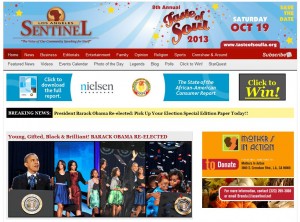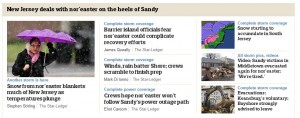Prior to reading Newkirk and Stephens & Mindich, I wasn’t even aware that there were minority newspapers (ignorant, I know). After reading, I definitely understand the importance of minority press, historically, and hence why there are still minority publications today.
Newkirk got me thinking, though with this quote: “While the nation’s racial landscape has radically changed between then and now, and the mainstream press — including television, radio, newspapers, and the Internet — is more diverse than ever, many believe the need for a racial minority press “to plead our own cause,” persists. (82)
She also wrote, “While a need for a viable alternative press is apparent, the diversity, however slight, of the mainstream media has contributed to the decline of the traditional black press. As mainstream newspapers and television began covering the civil rights movement, black readers became less reliant on the black press for news and information.” (Newkirk 82)
My question is, if minority reporting is being integrated into the mainstream media, and if we as a democracy are striving to achieve an America that is not racist, why would there be a problem with mainstream media being more incorporating when it comes to minority reporting? Shouldn’t this be what we want, if we are seeking a public that is not white-normative? I would think that diversity within mainstream media is a good thing. Yes, it is still extremely important for minorities to be represented in these publications, but I would think that having entire publications devoted to minorities would further the separation of races, instead of bringing them together. Maybe I am showing my ignorance again, but it just seems sort of logical.
Secondly, how can media that is explicitly published for minorities be written without bias or framing? I found the website for the Los Angeles Sentinal, and although it has been two weeks since the Presidential Election, the headline reads, “Young, Gifted, Black and Brilliant! BARACK OBAMA RE-ELECTED.” I understand that the audience the newspaper is being written for was generally supportive of President Obama’s re-election, but come on, the headline has an exclamation point in it. If that’s not bias, I don’t know what is.
I understand what the point of explicit minority news was during times when minorities were more oppressed by the American Public. For example, Newkirk wrote, “While the independent spirit of the minority press is taken for granted today, it is difficult to fathom the kind of limitations on free speech that were, at the birth of the nation, imposed on African Americans and Native Americans and those who supported them.” (84) And that’s not to say that minorities aren’t oppressed now; I do realize that racism still exists and that there is still much inequality in our nation. However, I just don’t see how a movement towards minority press within the context of mainstream media could be a bad thing. Representation in such news outlets would seem to be a good thing for these smaller publics.

Stephens and Mindich said in their essay, “The inherent blind spots and prejudices of journalism, along with the often unrecognized blind spots and prejudices of its practitioners, are themselves, in many instances, the “message,” the factor that changes our view of the political world. We have to battle, the point is, against the bewitchment of our politics by means of journalism.” (377) I can see the importance of what is being reported in the Sentinel. There are stories that pertain exclusively to African-American audiences, and they are important things that both African-American, as well as white (if we are to be a truly progressive nation) audiences should be aware of; however, it would be more progressive if these stories were printed in a section of the Los Angeles Times rather than in a newspaper that will mostly be read by African-American readers. I understand that there are limitation on media such as ad space, revenue, and other logistical aspects such as time and human capital, however if it were possible for minority papers to integrate into mainstream media. I am not saying they should transition their stories to be mainstream — rather, they should maintain their race-specific voice and be printed alongside other stories for a general public.
If anyone thinks I’m really wrong or just missing something, please point it out. I felt kind of bad writing this post, but these are questions I have and I’m just curious why our readings didn’t necessarily praise the integration of minority press with the mainstream media.








